The organization Million Moments will hold a protest in defense of democratic institutions on Sunday, March 1st, in Prague.
The event will start at 4 p.m. with a march from Hradčanska to the Old Town Square, which will be followed by a demonstration. The protest is a reaction to Wednesday’s election of Stanislav Křeček as the Ombudsman.
A Million Moments had previously announced that they would convene the demonstration if Křeček was elected.
“The Prague event will not be about protesting against Stanislav Křeček. His election as the Ombudsman is ‘only’ one particularly blatant example of how government and major institutions are systematically and intentionally politically decomposed and privatized step-by-step. The special-purpose coalition of ANO, SPD, KSCM, with the assistance of a part of the CSSD, gradually and systematically decomposes important democratic institutions that are supposed to control the rules and serve all citizens, not selected politicians,” said Million Moments in their press release.
“If it goes on like this, what happened in Hungary or Poland will eventually happen here. Justice, the media, government, and public procurement will be subordinate to politicians. In such a situation, we can no longer speak of completely free elections, because government politicians have completely different options than the opposition. Government politicians concretize in power by distorting the whole system,” said the chairman of the association, Mikuláš Minář.
On Sunday, the association will announce what events will take place in regional cities.
Křeček was elected for the position of Ombudsman, or Public Defender of Rights, on Wednesday. Critics of the former chairman of the Association of Tenants of the Czech Republic call him ‘the enemy of nonprofits.”
In the past, Million Moments has called for 19 demonstrations. Two of them were at Letná last year, both of which gathered over 200,000 people. Two hundred eighty thousand people met in June and 250,000 in November.
Prague has begun a new campaign to “tame” short-term leases offered via digital platforms. With this in mind, Councilor Hana Marvanová (United Forces for Prague/STAN) prepared a legislative initiative regulating legal standards for business in the e-commerce segment.
“Unfortunately, the current legislation does not provide Prague, as well as other cities in the Czech Republic, with effective tools to address the issue. That is why I have prepared a legislative plan for legislative changes in four areas,” said Marvanová.
The first proposal requires Airbnb-type platforms to provide municipalities with detailed information regarding flats involved in the business. Specifically, it should share the basic host data and number of guests.
Mandatory transmission of information
With a similar demand for platforms to give this information to Prague voluntarily, the capital led unsuccessful negotiations with Airbnb last year. However, Marvan is now optimistic about the possibility of enforcing more control by “force”.
Last week, she presented proposals for a meeting with the Minister for Regional Development, Kateřina Dostálová (ANO), as well as representatives of parliamentary clubs and professional organizations. All those present said they supported the requirement of mandatory disclosure of information, which should lead to the enforcement of existing obligations, such as the payment of accommodation fees or the reporting of the establishment.
MEPs realized that this is not a purely Prague problem
“The deputies finally realized that this is not a purely Prague problem,” stressed the councilor. Her proposals could ideally go to the Chamber this year. The other three requirements aim at a stronger position of municipalities and owners of neighboring flats in relation to short-term rental providers.
According to the municipality, almost half of the flats in the town center are used for rental providers such as Airbnb. T
here are around seven thousand flats active on Airbnb throughout Prague. “Unregulated accommodation services generate a number of problems. In addition to the pressure on housing prices, it is also a phenomenon of overturism, which includes, among other things, an abundance of tourist attractions,” said Mayor Zdeněk Hřib (Pirates).
The emerging art center will open in the spring of 2021. However, it already attracts visitors with its Facade Project
Exhibitions of lesser-known and emerging artists, educational events for children and adults, a library and book lounge. All this will be offered to visitors of the new art center Kunsthalle Prague, which is being created in Klarov. And although the opening is planned for May 2021, the building is already attracting passers-by art projects on its facade. At present, there is an installation of Lightness by Ukrainian artist Aliona Solomadina.
The new artistic and cultural space is created by the transformation of Zenger’s former transformation station. “This June, the rough construction will be completed and at the end of 2020, the reconstruction should be completely finished. Afterward, some restored elements that were previously removed from the building will gradually return,” says Martina Zátorská, spokeswoman for Kunsthalle Praha.
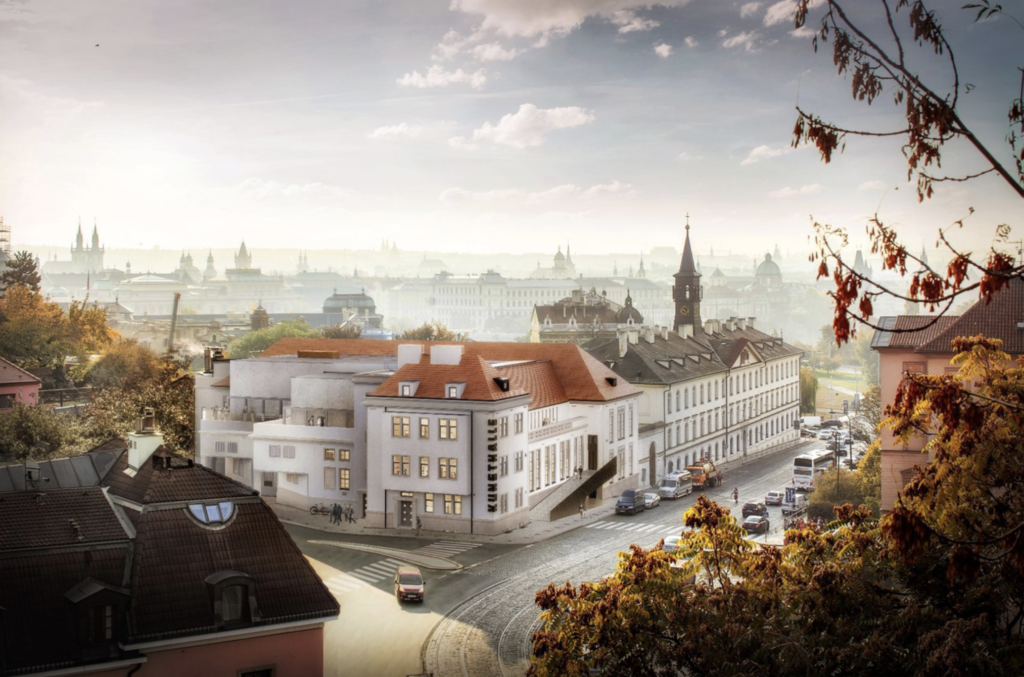
New and Forgotten
There are many public and private institutions in Prague that are like Kunsthalle. So how will this arts center be unique? “We want to bring more opportunities to the local cultural scene, among other things to support emerging artists, discover forgotten names and open up unexplored topics in an international context. We will present thematic and author exhibitions together with Central European and international art. We will create an interdisciplinary program combining 20th and 21st-century art with literature, music, film, science, and architecture,” says Zátorská.
The exhibition halls will offer space of 1,300 square meters. There will also be a quality restaurant, a café overlooking Prague Castle and the book lounge, where visitors will be able to relax and absorb their exhibit experience.
The program will also include educational events for children and adults. According to Zátorská, the specific topic of the first exhibition project remains secret. “We can only mention that inspiration is partly based on the history of a building where electricity was once pulsating.”
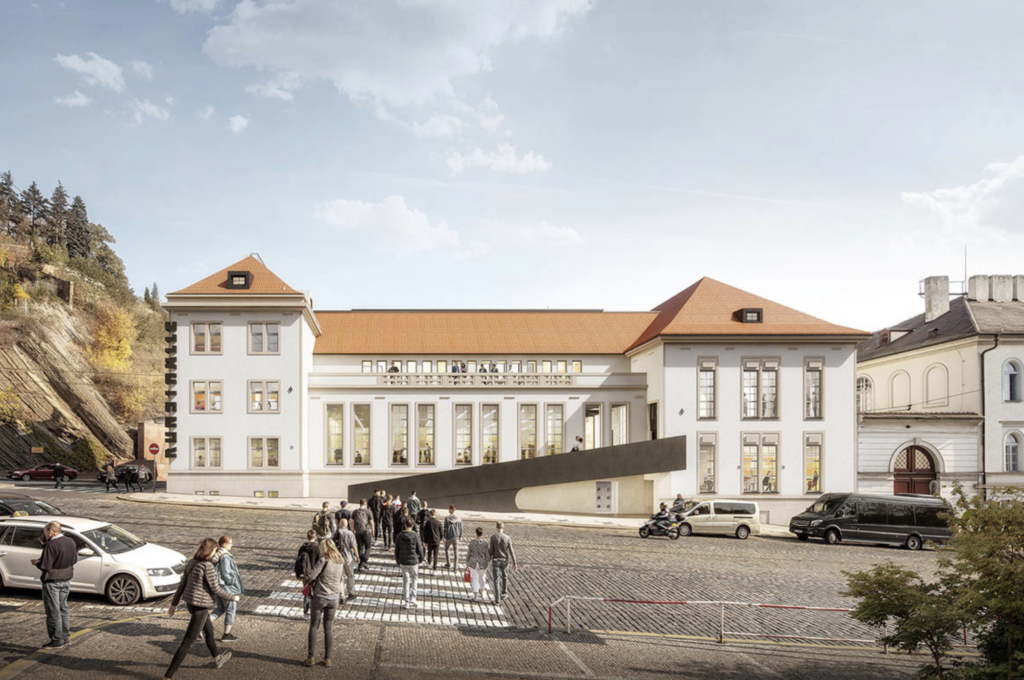
Art on the Facade
The building attracts visitors through original works of art, presented on the facade of the building. The Facade Project is a continuation of the earlier plan to place four light kinetic sculptures by sculptor Zdeněk Pešánek on the façade of the building, which was eventually not realized So far, the building has featured the TransFormation project by Federico Díaz, a reflective inscription by the Greek artist Antonis Pittas and the monumental canvas Exit the Loop by Adéla Součková.
Currently, passers-by can enjoy Lightness by Ukrainian artist Alion Solomadina. “Solomadina’s work appealed to us, so we asked her to collaborate. Lightness is part of her creative project City of Forms, which aims to find new typographic forms inspired by architecture and life in different cities of the world. We are glad that this artist has connected Prague with ease,” added Zátorská.
This Friday and Saturday, newly formed D’Prompt Theatre will present Inevitably I Drink, a play adaptation of Venedikt Yerofeyev’s Russian prose poem Moscow Circles.
Inevitably I Drink will be the inaugural production of D’Prompt Theatre, which was founded this December by theatre artists Christopher Adamson and Levan Mania. Levan Mania, the theatre’s Creative Director, wrote the adaption and English translation and serves as director of the show. This will be the world premiere of the English adaption and translation.
According to Adamson, D’Prompt’s Artistic Director, the young theatre company rallied together to make their first production a reality. Adamson and Mania were inspired to create an English-language theatre troupe in Prague that focuses on producing both contemporary plays and classics with a diverse ensemble of actors, directors, and teachers from all around the world.
“We perform in English as an international language, but we also have our scripts translated into Czech for subtitles for every performance.” said Adamson. “We want to educate people through the use of theatre, give them some food for thought, and to engage the Czech population as we are living here in this country as mostly expats.”
“We have a really diverse cast of nationalities in our team: Georgian, Indian, Greek, Korean, Russian, Tatar, Swedish and even a Haitian American,” he added.
Since December, the troupe has built their own set, made their own costumes, and has been rehearsing out of rented space in an artistic space with a bar in order to prepare for their first production.
Inevitably I Drink, which is based on Venedikt Yerofeyev’s pseudo-autobiographical postmodernist Russian prose poem Moscow Circles, tells the story of destitute people and the reason behind their drinking problems, and the escapism they express through storytelling, history, philosophy, and politics.
“If I had to describe the play in one word, it would be “Compassion,” said Adamson.
Inevitably I Drink will be performed February 14 and 15 at 19:30 at Divadlo 21. This production will be performed in English with Czech subtitles. Tickets are available for sale here.
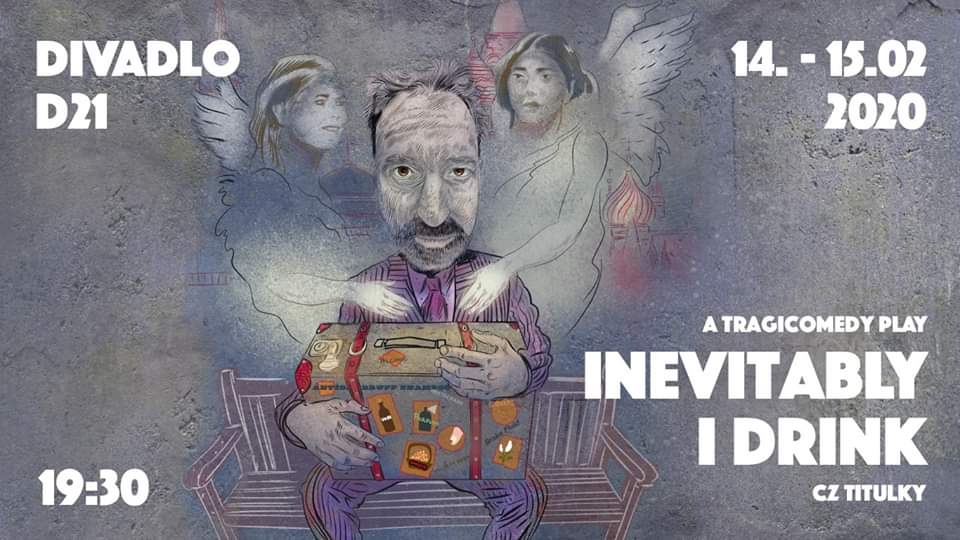
In addition to the famous Old Town Astronomical Clock, Prague also had a… second astrological clock in the New Town on Karlovo náměstí.
The clock was far from spectacular: it had no comparable architectural decoration and there was no figural decoration. However, it was noteworthy that it had a completely different style than the clock in Old Town. It was an astronomical clock of the Italian type, whose most famous representative is in Padua, Italy at Pallazzo del Capitano.
The clock in Padua, Italy features a large dial with a protruding globe. The concentric circles gradually show the moon with its phases and ecliptic signs. The outer circle is a 24-hour clock face. The Astronomical Clock of Padua is complemented by a raffia that carries a cube depicting the Sun.
The astronomical clock on the New Town Hall tower was smaller than the Padua tower. The surviving depictions show images of the phases of the moon and the signs of the zodiac. The astronomical clock also showed the orbit of the Sun. The New Town Hall lacked an external 24-hour circle.
Interestingly, both the Padua and New Town clocks had only eleven zodiac signs depicted. One of Padua’s signs was missing, apparently, because the local councilors did not pay for it properly, and he instead deleting one sign. The New Town Astronomical Clock was probably just a simple omission, or more likely, that the artists wrongly planned the drawing and the twelfth sign simply did not fit on the design.
The New Town Astronomical Clock was likely destroyed due to the ancient ravages between the Old and New Town of Prague, which were independent towns until 1784. Moreover, the machine was removed at the end of the 18th century. The Old Town Astronomical Clock escaped a similar fate, and still remains preserved.
You can find more information about the second Prague astronomical clock in David Černý’s book 25 Secrets of Prague.
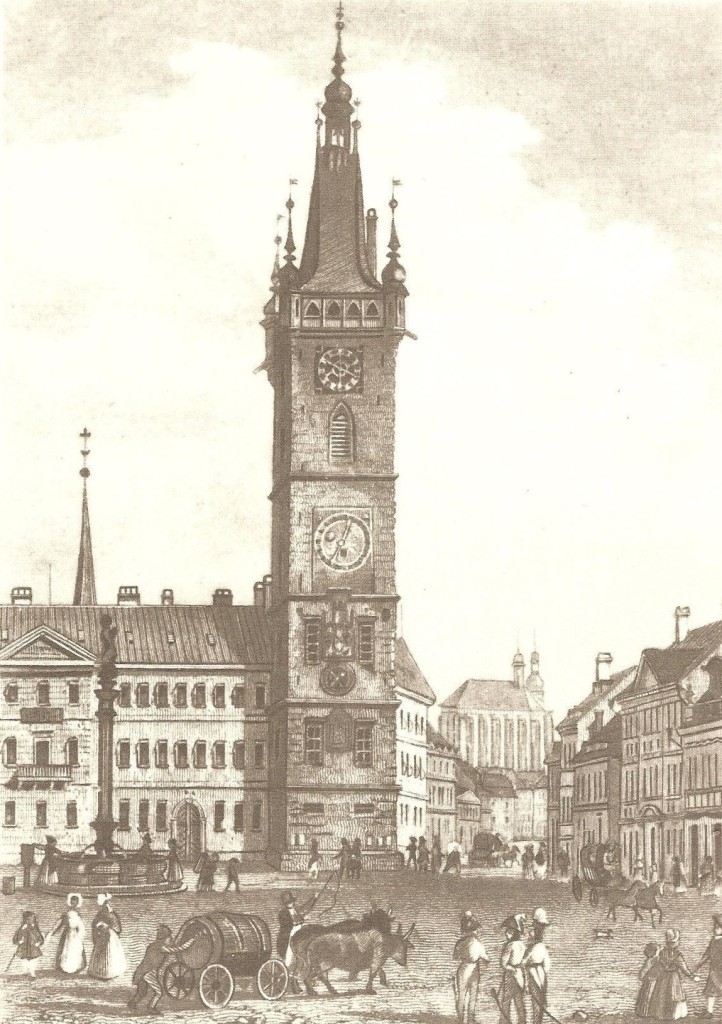
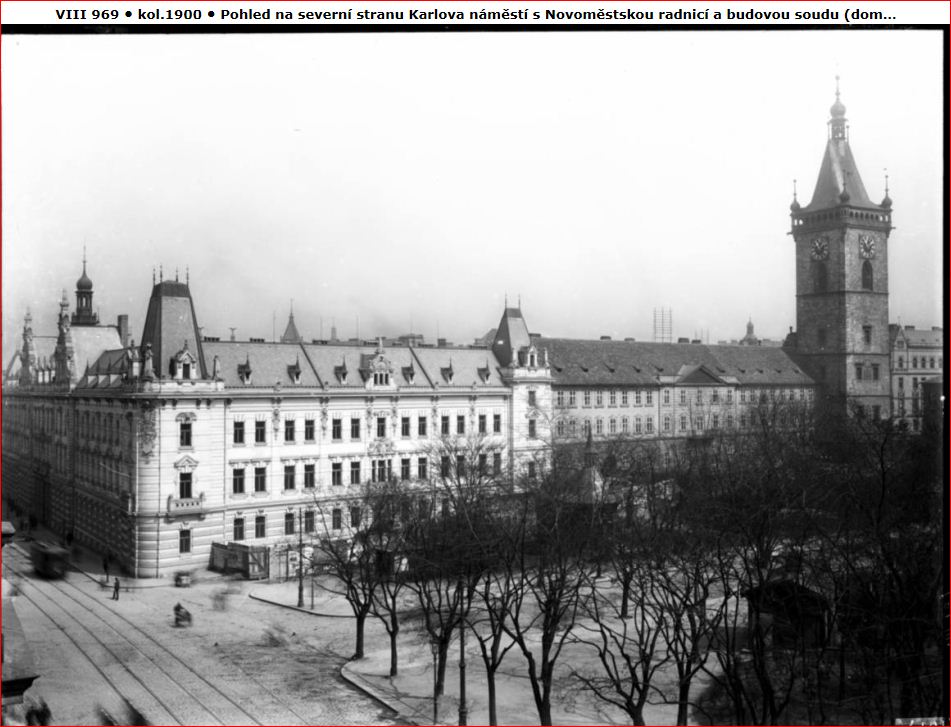
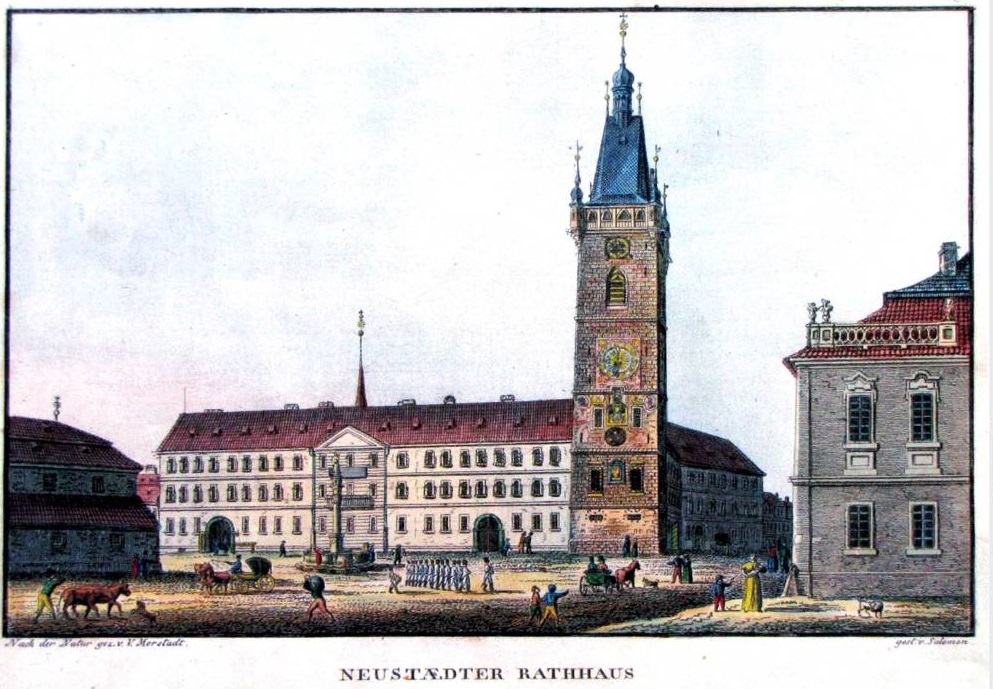
Vietnamese airline Bamboo Airways started selling tickets from Prague to Hanoi. The carrier will deploy the Boeing 787-9 twice a week from 29 March.
The airline will fly on Sunday and Wednesday. From Prague, the plane will fly at 18:05 and land in Hanoi at 9:35 local time after 10 hours and 30 minutes of flight.
The flight back from Hanoi leaves at 9:20, and will land in Prague at 4 pm after 11 hours and 40 minutes. The lowest fares are around 16,000 CZK, but Bamboo does not yet offer the Bamboo Eco class in the reservation system.
This is usually the cheapest fare and applies to passengers without cabin baggage. The flights to Prague were confirmed this January on the 70th anniversary of the establishment of diplomatic relations between Vietnam and the Czech Republic.
“According to our estimates, over 50,000 passengers in both directions could use the new route between Prague and Hanoi twice per year,” said Václav Řehoř, chairman of the Prague Airport Board.
Bamboo Airways will be Vietnam’s first private airline to operate wide-body aircraft at the end of this year. “We ranked the European market as key, and so in 2020 it is one of the priorities for the development of Bamboo Airways, as well as for the development of tourism and other FLC Group investments,” said Truong Phuong Thanh, Deputy CEO of Bamboo Airways.
Four years ago, the then Mayor Adriana Krnáčová (ANO) decided that the card for travel by Prague public transport would be called Lítačka. It was not without criticism. The current city administrator Zdeněk Hřib (Pirati) has now announced that he plans to rename the Lítačka application.
“We are planning a survey to rename the mobile application PID Lítačka. What do you think we should call it?” Hřib asked at the end of Friday’s Facebook post, in which he presented a limited edition public transport card designed by fifteen-year-old Matěj Hošek, who suffers from Asperger’s syndrome and is very fond of drawing city transport route plans.
Hřib said on Saturday evening that the name will remain for the card. “I primarily want to find out what the Prague citizens want to do with the name, but we will not rename the plastic card in the foreseeable future,” said Zdeněk Hřib. The change is related to the digital version, which allows you to upload a ticket to your mobile phone, among other things.
“We want the service to be as user-friendly as possible. Therefore, we will also look for a suitable name for the application, which would be understandable for visitors from abroad. I think that Prague citizens will come up with a number of inspirational ideas,” said the Mayor.
The name Lítačka was decided in the spring of 2016. “The two-word names were too long, and the name “tramcar” did not work because the card can be used not only on trams.” Mayor Krnáčová defended the decision and argued that the name Lítačka caused 52.5% of positive responses on social networks.
In discussions, however, people spared no criticism. Some pointed out that they knew the word “lítačka” as a synonym for jogging, and jokingly suggested calling the card Krndačka. The predominance of Prague residents defended decades-proven “tramcar.”
With Lítačka, Prague replaced the problematic Opencard, a project worth more than a billion crowns, the consequences of which are still being resolved by the courts.
The card, which allows for travel on public transport in Prague and Central Bohemia, also serves as a pass Prague libraries. Currently, over 859 thousand cards are registered in the Lítačka system, and a long-term pass is recorded on more than 630 thousand.
As of August 2018, passengers can transfer tickets to contactless bank cards or Czech Railways Cards. Since December 2019, it is sufficient to have a long time ticket recorded only on a mobile phone on the PID Lítačka application.
Are you in favor of renaming the Lítačka application?
As Central European cities, Vienna and Prague are connected not only by a common history but also by a common interest in further developing friendly relations. Therefore, the City of Prague has today approved an agreement on mutual cooperation, thus continuing to formalize urban relations and address key issues of regional development.
Prague and Vienna agreed on thirteen areas of cooperation. The key topic is housing policy, and whether to support housing construction or the system of housing allocation. Another important point is waste management, and the management and maintenance of green areas in the city.
The cooperation agreement will also concern the digitization of urban areas; for example the framework of electronic building permits, transport, and infrastructure, which can be used in the case of the construction of electric vehicle charging stations or the cultivation of public space.
“I think it is important to cooperate with partners with whom we have a lot in common, whether it concerns a common past or the Central European space we share. The already proven solutions to similar problems that we face as a metropolis are then easily transferable. Moreover, Vienna has long been ranked among the top quality of life rankings, so I believe that it is a partner with whom we can inspire in many ways,” says Zdeněk Hřib, Mayor of Prague.
Cooperation between the two cities has been developing successfully for a long time but has not yet been contractually anchored. With this agreement, the capital follows the trend of formalizing and strengthening inter-urban relations, such as in the Free Cities Pact, which Prague joined together with Bratislava, Budapest, and Warsaw last December.
The Prague-Vienna Cooperation Agreement also contributes to the realization of the sustainability goals defined by the United Nations in the “2030 Agenda for Sustainable Development.”
ICON Communication Centres s.r.o. (ICON), a leading supplier of business process outsourcing (BPO) services, proudly won the European Contact Centre and Customer Service Awards (ECCCSA) coveted Gold Award for the ‘Best Implementation of Technology’. The award recognised ICON’s success in devising and deploying a technology solution that unified the disparate systems of its client, a leading supplier of global payment solutions for car parks around the world. This is the second year in a row that ICON has won the Gold award in this category, the first announced of the evening.
“It was tough winning an ECCCSA this year. Organisations across Europe are doing outstanding things to improve the employee experience, and the ramping up of technology focused on progressing the customer experience in line with customer demand is incredible. Winners this year are fine examples of how the customer contact industry is pushing boundaries and delivering excellence.”
Ann-Marie Stagg, Chair of the Judges, ECCCSA
Judges recognised how ICON streamlined the management of incoming customer inquiries across thousands of parking sites worldwide to positively impact the customer experience of car park users in Europe, South America, and the United States. ICON effected significant improvement to the client’s customer experience and return on investment.
The client’s fixed budget meant that ICON absorbed the entire cost of the technology outlay. Highly accurate forecasting ensured confidence in the solution outcome, which ultimately resulted in the client being able to achieve more within their budget whilst vastly improving their customer experience. ICON moved its client from an unstructured system and a lack of business intelligence, to having 100% visibility across all customer care costs and location costs. The BI now available significantly improves the client’s ability to confidently scale their business. ICON’s entire customer care transformation took just weeks from conception to delivery. Achievements, include –
- a reduction in the cost per customer service interaction to less than 25% prior to the solution implementation
- a reduction in average handle time (AHT) of incoming customer calls from 3-4 minutes to less than 1 minute
- a reduction in email response times from 1-2 days down to 4-5 business hours
ICON’s goal for its business is to empower technology and talent that best connects global brands with local customers. In securing the Gold Award, the contact centre is further solidifying the realisation of their momentum within the outsourcing industry.
“This BPO solution was driven entirely by ICON’s Operations and Customer Success teams. They identified how technology integrated with talented colleagues could provide a vastly improved customer experience for our client. The consultative value of ICON’s mature and experienced workforce was vital to the success of this transformation as it was deployed across multiple global markets and languages.”
Helen Hickin, Managing Director, ICON Communication Centres
Highly regarded for the integrity and credibility of the judging process, the European Contact Centre and Customer Service Awards are the largest and longest-running awards in the customer contact industry. High calibre judges were handpicked for their contact centre experience and knowledge, as well as their ability to recognise organisations that are leading the way in delivering exceptional service to customers.
The ECCCSA took place last night at Evolution, Battersea Park, London, and were hosted by BBC journalist Fiona Bruce. The awards programme saw companies from 24 countries participating, including some of the most senior customer experience professionals in Europe, as well as key industry influencers on customer contact.
November in Prague paves the way for the holiday season with lots of festive events!
1) Concerts
Prague has a great selection of music venues of all sizes, which means there are frequently some internationally touring artists coming through town. You’ll see a few big names in November:
- Lewis Capaldi – November 7
- Sarah Brightman – November 8
- Little Mix – November 21
- Skillet – November 28
- Andrea Bocelli – November 30
2) St Martin’s day
11th November is St Martin’s day and the one-day festival largely revolves around food and specifically, goose. Almost all restaurants in the centre will have a St Martin’s goose menu and be serving special St Martin’s wine.
3) Theatre
Blacklight theatre has become a staple in Prague’s theatre community.
These performances are great for audiences of all ages and nationalities, as they are nonverbal and therefore without a language barrier. IMAGE Blacklight Theatre is one of the main spaces presenting this type of entertainment.
There will be multiple performances throughout the month of November.
4) Christmas Market
The Christmas Market at Prague Castle opens on November 23, 2019, and runs through the first week of January 2020. More than 70 stallholders will display their wares at Christmas markets here.
5) Whisky Life!
Whether you’re a whisky connoisseur or simply curious, the Whisky Life! Festival is a perfect way to learn more and appreciate this spirit. Food vendors will be onsite so you won’t go hungry as you sample all the spirits and cigars.
6) Free Art Exhibit
Until November 30, 2019, you can see an impressive photographic exhibition covering the 1989 Fall of the Iron Curtain in Central Europe.
The exhibit is on display at Prague Castle and is free to view from 10:00 am – 18:00 (6:00 pm). The photos are from multiple photographers who were front and center for these events 30 years ago.
This weekend the eighth year of the Prague Coffee Festival will take place in Holešovice.
It is the biggest coffee festival in the Czech Republic where professionals from the world of coffee, as well as enthusiasts from the general public, regularly meet.
The festival will also offer a variety of refreshments from both salty and sweet bakery products and pancakes, home-made cheesecakes, and doughnuts to hamburgers and Asian or vegan specialities. The music scene will be taken care of by DJ Pocoloco (Cabaret Manana).
Recently a lot of attention has been paid to coffee, particularly to specialty coffee and to new brewing techniques which have even become popular among the general public. The festival weekend will be filled with tastings, coffee shop and roastery presentations, workshops, lectures, and a music program.
During both days, several lectures led mostly by foreign guests from the world of coffee will take place. These include:
- Dr. Samo Smrke, who works at the University of Applied Science in Zurich, in the department of Coffee Competence Centre and Analytical Technologies;
- Martin Hudák, the World Champion in the Coffee in Good Spirits competition, who will speak on the coffee cocktails of the future;
- Gwilym Davies, an internationally known jury member in coffee competitions and tutor, who will present the basics of coffee to the visitors;
- Veronika Tázlerová, a blogger and author of Prague Coffee Guide and the map of cafés, who will give you advice on how to simply take photos and arrange (not only) coffee to be put on Instagram, and how to use this social network effectively for marketing presentation of a café or roastery.
You can buy the tickets for the festival in electronic form at coffeefest.cz.
A one-day ticket costs CZK 399 and includes the unlimited degustation of coffee at the festival and, at the same time, the entry to the lectures, workshops, and cuppings. The entrance fee includes also the map of Prague cafés, containing all businesses from all the existing editions of Book of Cafés, to be received by the visitors at the venue.
The Prague Coffee Festival is organized by the Coffee Embassy association whose mission is to promote coffee culture and raise public awareness about coffee, coffee growers and processors, and new trends. The Prague Coffee Festival was established in 2012 by a team of the mamacoffee roastery
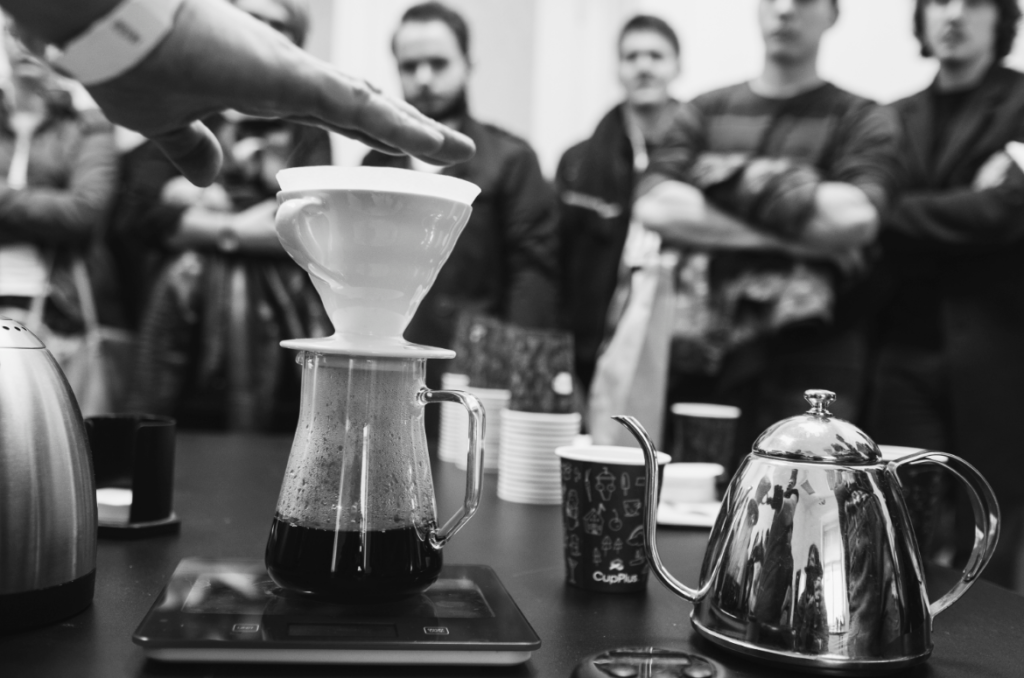
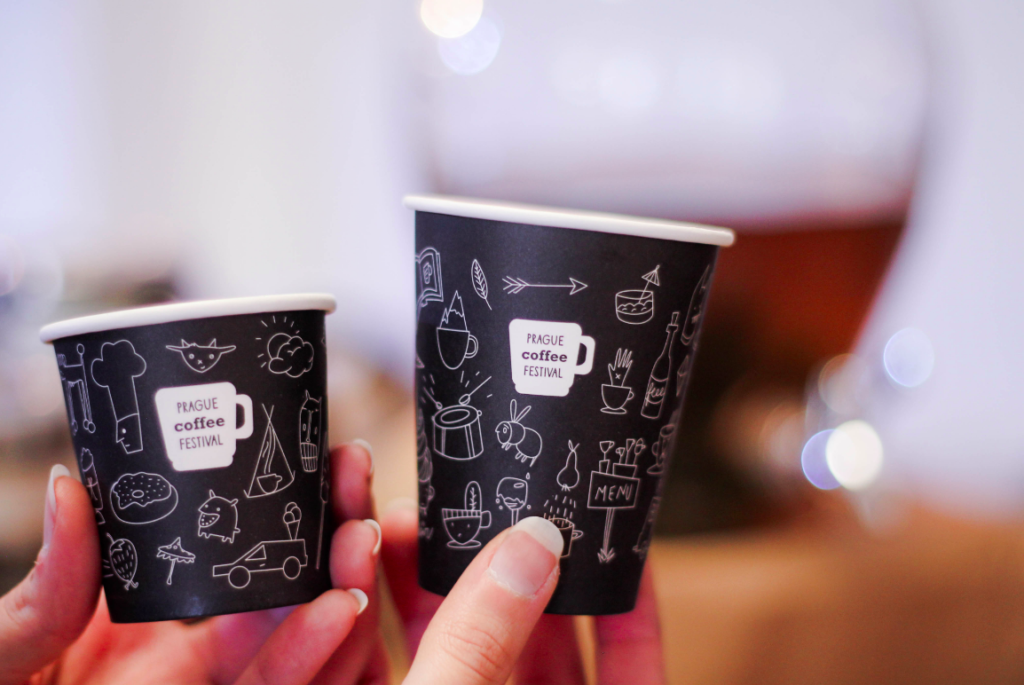
Many catering facilities work ineffectively and non-ecologically. The overproduction of waste is a big problem that the Circular Economy Institute is trying to change. Cafés and restaurants turn out to be some of the main contributors to waste production, due to strict hygiene measures or financial advantage.
The Institute has launched the “Circular Café Project”, which focuses on the most basic aspects of running a cafe, and at the same time, makes it the easiest to work with. For these purposes, the so-called “Ten commandments of Circular Café” were created. The ten points that every Cafès should try to follow, include, for example, the reduction of use of disposable tableware, the use of coffee grounds or the reduction of wastewater. Which each café should perform in order to obtain the status of a circular café.
The project is carried out in five cafes in Prague 7: Lajka, Letka, Alchymista, Vnitroblock and Cobra bar.
“We needed to start somewhere, and these cafes had themselves offered to start,” said Institute spokesman Ivan Hekerle.
The pilot project was launched last year in November and it will end in April. The main purpose now is to gather information and experiences, that will be used in the future. “At the end of the pilot phase, we will take into consideration the condition of the cafés, the shortcomings and we will examine the strength and the weakness of the project. We would also like to create a handbook of the “Circular Café” project, that we could offer to other businesses” adds Hekerle.
In addition to the “Circular Café” project, the Institute organizes many workshops and lectures to inform people about the theme.
The realization of these events is only possible due to the support of the Prague Services and the Prague 7 city district. “I would consider it a great success if other Cafés supported and perhaps took part in the project”, concludes Ondřej Kolínsky.
